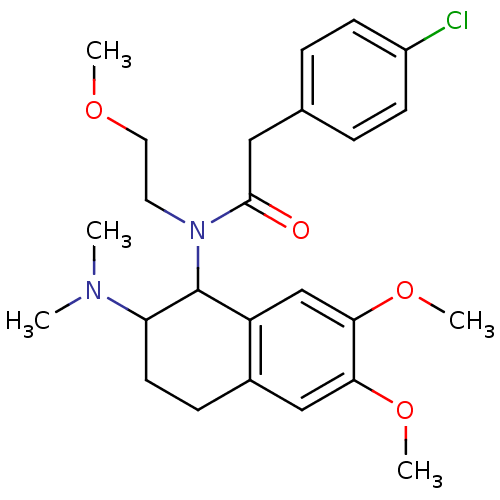

 Search and Browse
Search and Browse
 Download
Download
 Enter Data
Enter Data
BDBM50276566 (+/-)-2-(4-chlorophenyl)-N-(2-(dimethylamino)-6,7-dimethoxy-1,2,3,4-tetrahydronaphthalen-1-yl)-N-(2-methoxyethyl)acetamide::CHEMBL459387
SMILES: COCCN(C1C(CCc2cc(OC)c(OC)cc12)N(C)C)C(=O)Cc1ccc(Cl)cc1
InChI Key: InChIKey=RMMUDGAIHYRSFJ-UHFFFAOYSA-N
| Target/Host (Institution) | Ligand | Target/Host Links | Ligand Links | Trg + Lig Links | Ki nM | ΔG° kcal/mole | IC50 nM | Kd nM | EC50/IC50 nM | koff s-1 | kon M-1s-1 | pH | Temp °C |
|---|---|---|---|---|---|---|---|---|---|---|---|---|---|
| Mu-type opioid receptor (Homo sapiens (Human)) | BDBM50276566 ((+/-)-2-(4-chlorophenyl)-N-(2-(dimethylamino)-6,7-...) | PDB NCI pathway Reactome pathway KEGG UniProtKB/SwissProt B.MOAD DrugBank antibodypedia GoogleScholar AffyNet | CHEMBL PC cid PC sid UniChem Similars | Article PubMed | n/a | n/a | n/a | n/a | >9.00E+4 | n/a | n/a | n/a | n/a |
University of Toronto Curated by ChEMBL | Assay Description Agonist activity at human cloned mu opioid receptor by [35S]GTPgammaS binding assay | Bioorg Med Chem Lett 19: 1228-32 (2009) Article DOI: 10.1016/j.bmcl.2008.12.095 BindingDB Entry DOI: 10.7270/Q2GT5N2W | |||||||||||
| More data for this Ligand-Target Pair | |||||||||||||
| Kappa-type opioid receptor (Homo sapiens (Human)) | BDBM50276566 ((+/-)-2-(4-chlorophenyl)-N-(2-(dimethylamino)-6,7-...) | PDB Reactome pathway KEGG UniProtKB/SwissProt B.MOAD DrugBank antibodypedia GoogleScholar AffyNet | CHEMBL PC cid PC sid UniChem Similars | Article PubMed | n/a | n/a | 922 | n/a | n/a | n/a | n/a | n/a | n/a |
University of Toronto Curated by ChEMBL | Assay Description Displacement of [125I]U69593 from human cloned kappa opioid receptor | Bioorg Med Chem Lett 19: 1228-32 (2009) Article DOI: 10.1016/j.bmcl.2008.12.095 BindingDB Entry DOI: 10.7270/Q2GT5N2W | |||||||||||
| More data for this Ligand-Target Pair | |||||||||||||
| Mu-type opioid receptor (Homo sapiens (Human)) | BDBM50276566 ((+/-)-2-(4-chlorophenyl)-N-(2-(dimethylamino)-6,7-...) | PDB NCI pathway Reactome pathway KEGG UniProtKB/SwissProt B.MOAD DrugBank antibodypedia GoogleScholar AffyNet | CHEMBL PC cid PC sid UniChem Similars | Article PubMed | n/a | n/a | 1.12E+3 | n/a | n/a | n/a | n/a | n/a | n/a |
University of Toronto Curated by ChEMBL | Assay Description Displacement of [125I]FK33824 from human cloned mu opioid receptor | Bioorg Med Chem Lett 19: 1228-32 (2009) Article DOI: 10.1016/j.bmcl.2008.12.095 BindingDB Entry DOI: 10.7270/Q2GT5N2W | |||||||||||
| More data for this Ligand-Target Pair | |||||||||||||
| Delta-type opioid receptor (Homo sapiens (Human)) | BDBM50276566 ((+/-)-2-(4-chlorophenyl)-N-(2-(dimethylamino)-6,7-...) | PDB Reactome pathway KEGG UniProtKB/SwissProt B.MOAD DrugBank antibodypedia GoogleScholar AffyNet | CHEMBL PC cid PC sid UniChem Similars | Article PubMed | n/a | n/a | >1.00E+4 | n/a | n/a | n/a | n/a | n/a | n/a |
University of Toronto Curated by ChEMBL | Assay Description Displacement of [125I]deltorphin 2 from human cloned delta opioid receptor | Bioorg Med Chem Lett 19: 1228-32 (2009) Article DOI: 10.1016/j.bmcl.2008.12.095 BindingDB Entry DOI: 10.7270/Q2GT5N2W | |||||||||||
| More data for this Ligand-Target Pair | |||||||||||||